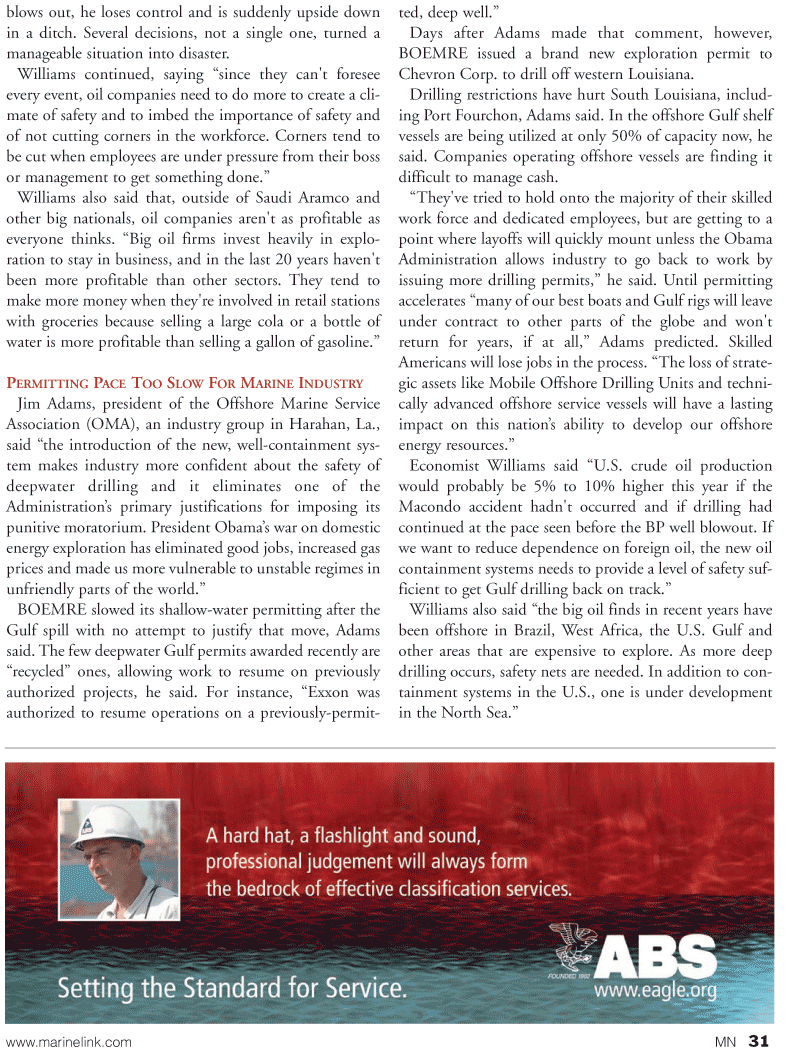
Page 31: of Marine News Magazine (April 2011)
Offshore Energy Edition
Read this page in Pdf, Flash or Html5 edition of April 2011 Marine News Magazine
blows out, he loses control and is suddenly upside down in a ditch. Several decisions, not a single one, turned a manageable situation into disaster.
Williams continued, saying “since they can't foresee every event, oil companies need to do more to create a cli- mate of safety and to imbed the importance of safety and of not cutting corners in the workforce. Corners tend to be cut when employees are under pressure from their boss or management to get something done.”
Williams also said that, outside of Saudi Aramco and other big nationals, oil companies aren't as profitable as everyone thinks. “Big oil firms invest heavily in explo- ration to stay in business, and in the last 20 years haven't been more profitable than other sectors. They tend to make more money when they're involved in retail stations with groceries because selling a large cola or a bottle of water is more profitable than selling a gallon of gasoline.”
PERMITTING PACE TOO SLOW FOR MARINE INDUSTRY
Jim Adams, president of the Offshore Marine Service
Association (OMA), an industry group in Harahan, La., said “the introduction of the new, well-containment sys- tem makes industry more confident about the safety of deepwater drilling and it eliminates one of the
Administration’s primary justifications for imposing its punitive moratorium. President Obama’s war on domestic energy exploration has eliminated good jobs, increased gas prices and made us more vulnerable to unstable regimes in unfriendly parts of the world.”
BOEMRE slowed its shallow-water permitting after the
Gulf spill with no attempt to justify that move, Adams said. The few deepwater Gulf permits awarded recently are “recycled” ones, allowing work to resume on previously authorized projects, he said. For instance, “Exxon was authorized to resume operations on a previously-permit- ted, deep well.”
Days after Adams made that comment, however,
BOEMRE issued a brand new exploration permit to
Chevron Corp. to drill off western Louisiana.
Drilling restrictions have hurt South Louisiana, includ- ing Port Fourchon, Adams said. In the offshore Gulf shelf vessels are being utilized at only 50% of capacity now, he said. Companies operating offshore vessels are finding it difficult to manage cash. “They've tried to hold onto the majority of their skilled work force and dedicated employees, but are getting to a point where layoffs will quickly mount unless the Obama
Administration allows industry to go back to work by issuing more drilling permits,” he said. Until permitting accelerates “many of our best boats and Gulf rigs will leave under contract to other parts of the globe and won't return for years, if at all,” Adams predicted. Skilled
Americans will lose jobs in the process. “The loss of strate- gic assets like Mobile Offshore Drilling Units and techni- cally advanced offshore service vessels will have a lasting impact on this nation’s ability to develop our offshore energy resources.”
Economist Williams said “U.S. crude oil production would probably be 5% to 10% higher this year if the
Macondo accident hadn't occurred and if drilling had continued at the pace seen before the BP well blowout. If we want to reduce dependence on foreign oil, the new oil containment systems needs to provide a level of safety suf- ficient to get Gulf drilling back on track.”
Williams also said “the big oil finds in recent years have been offshore in Brazil, West Africa, the U.S. Gulf and other areas that are expensive to explore. As more deep drilling occurs, safety nets are needed. In addition to con- tainment systems in the U.S., one is under development in the North Sea.” www.marinelink.com MN 31

 30
30

 32
32
